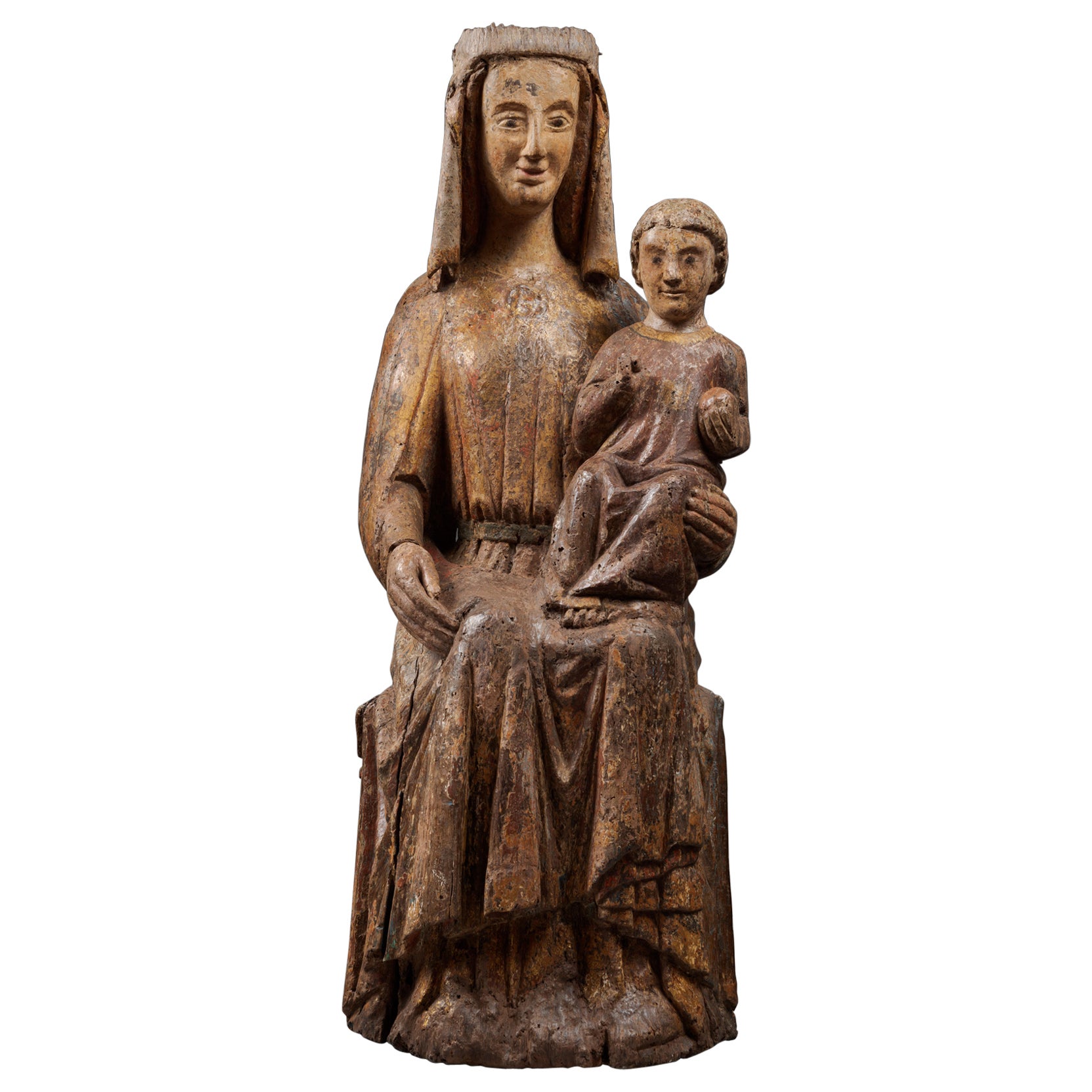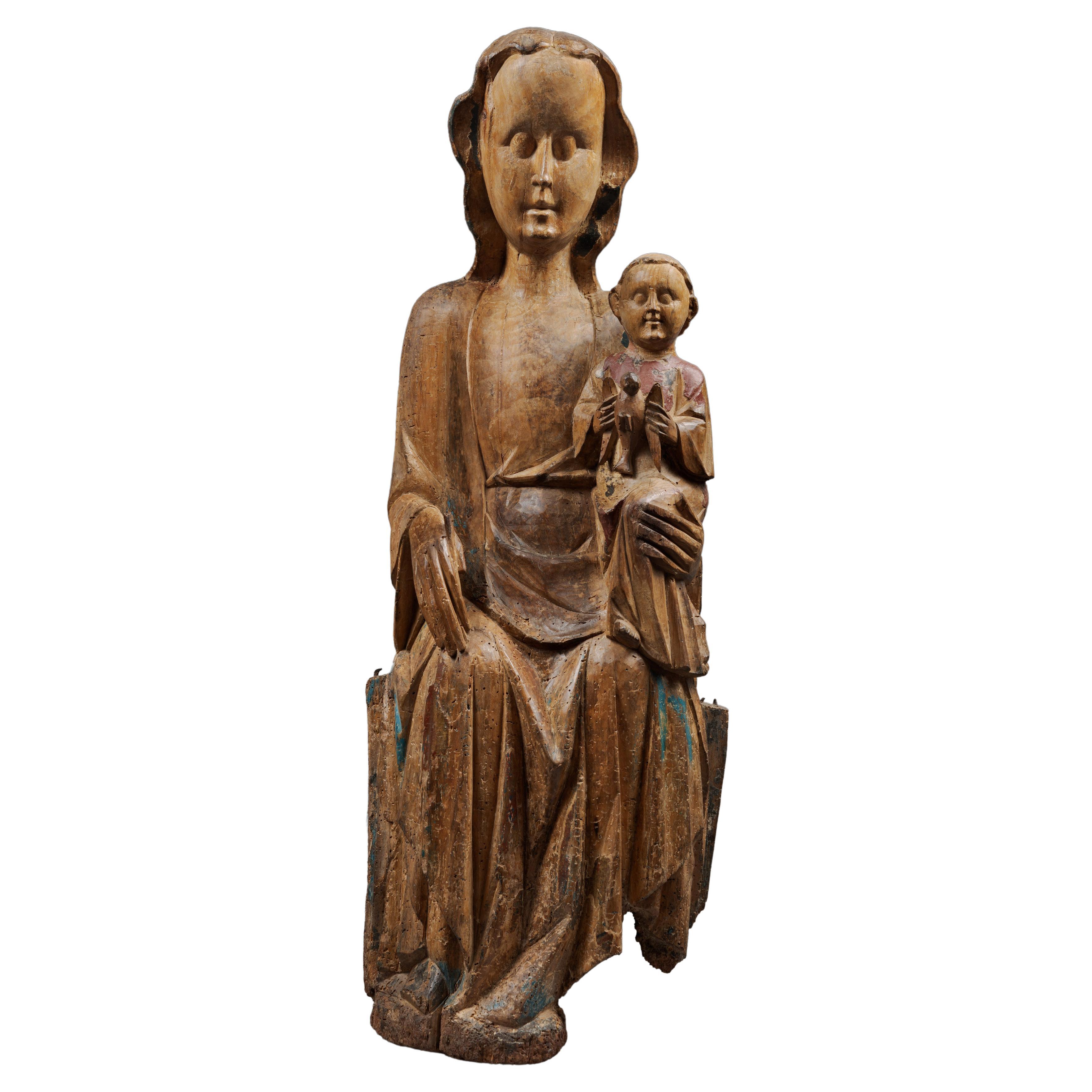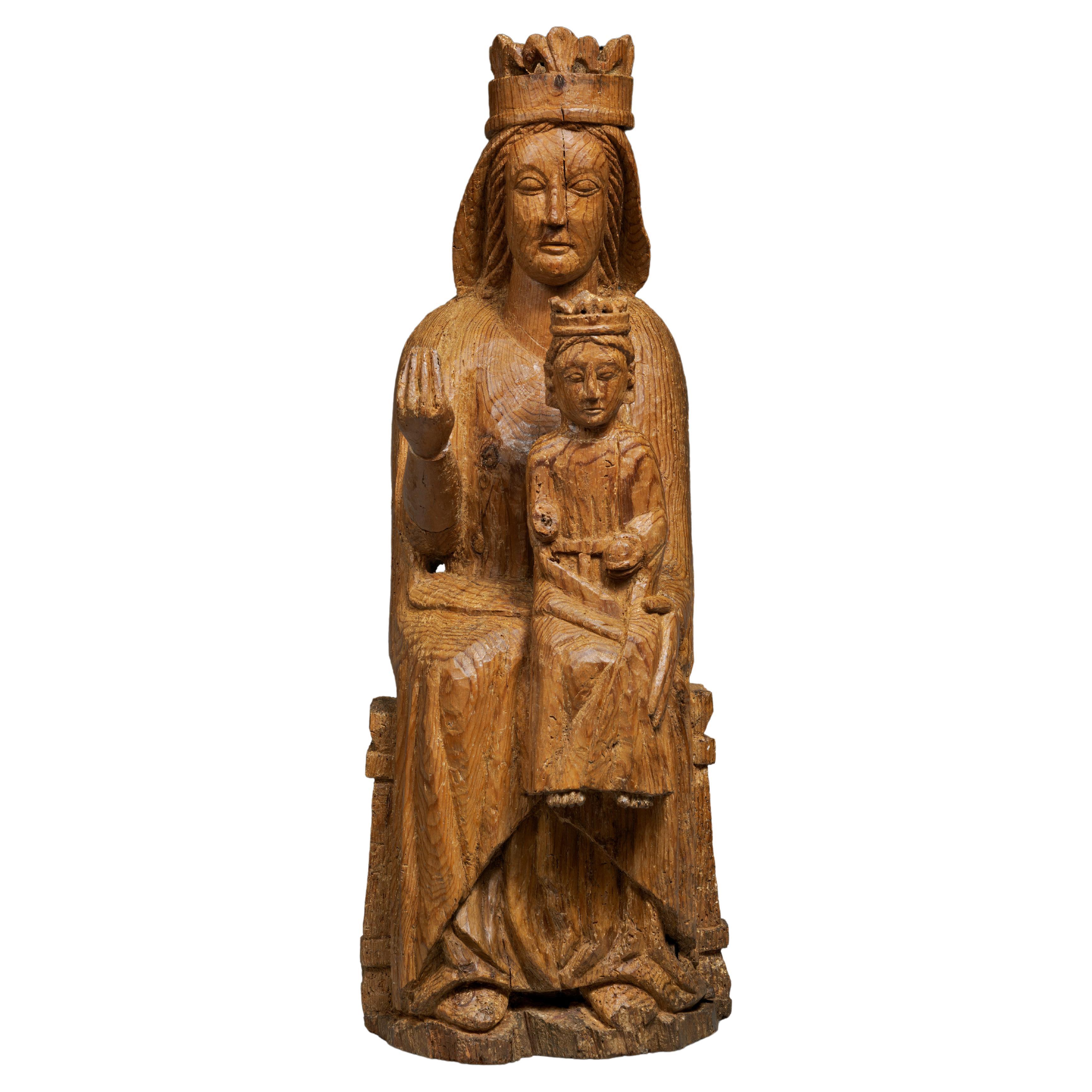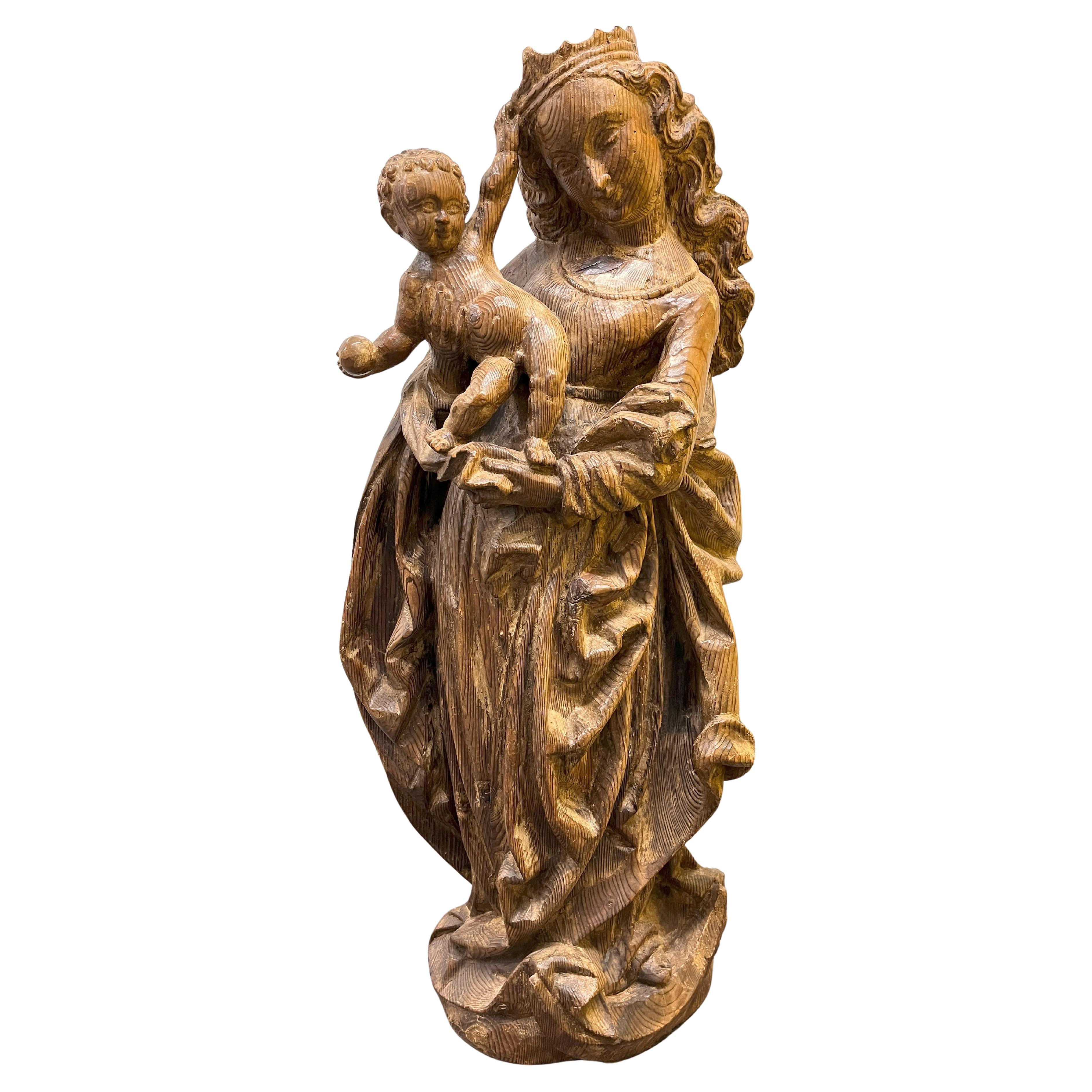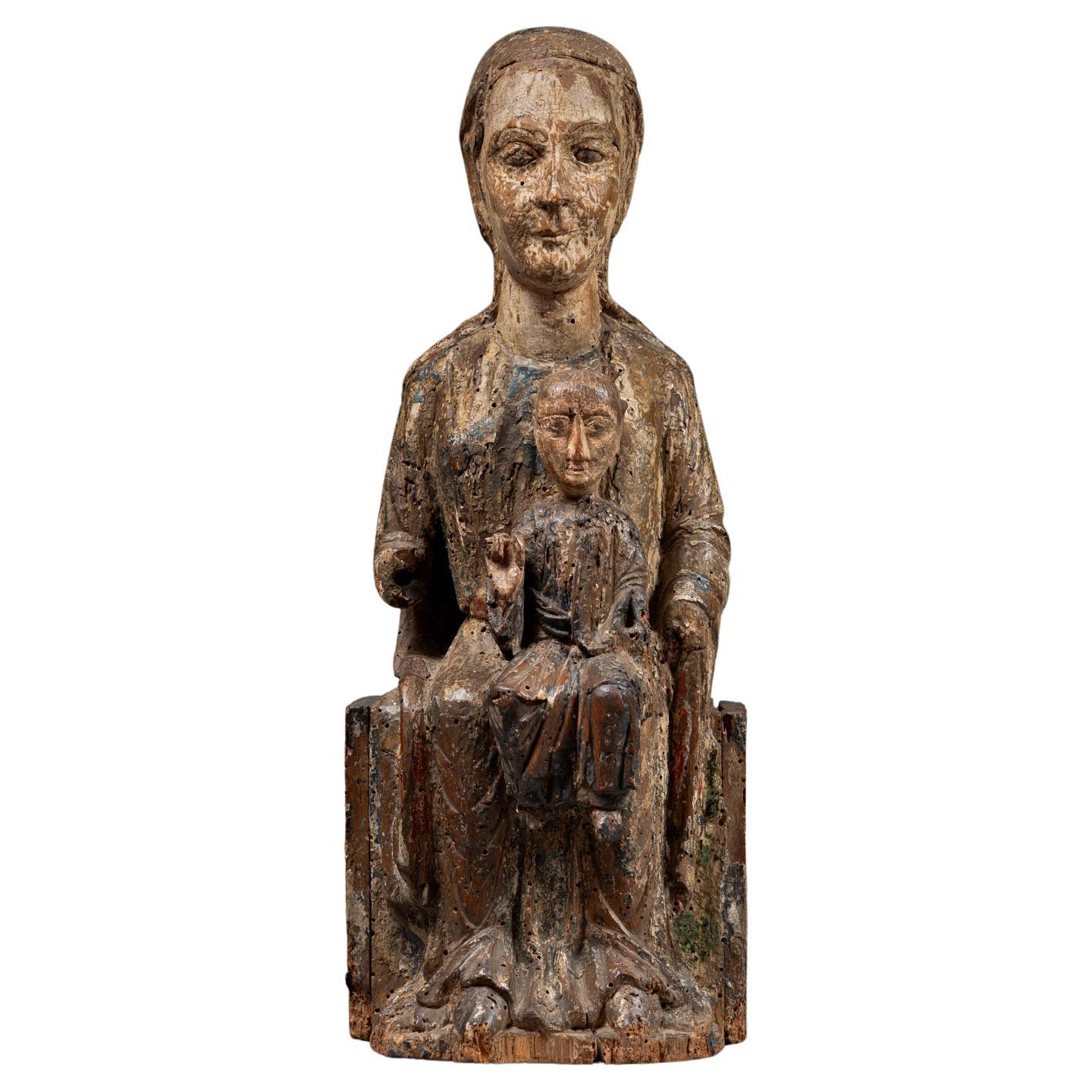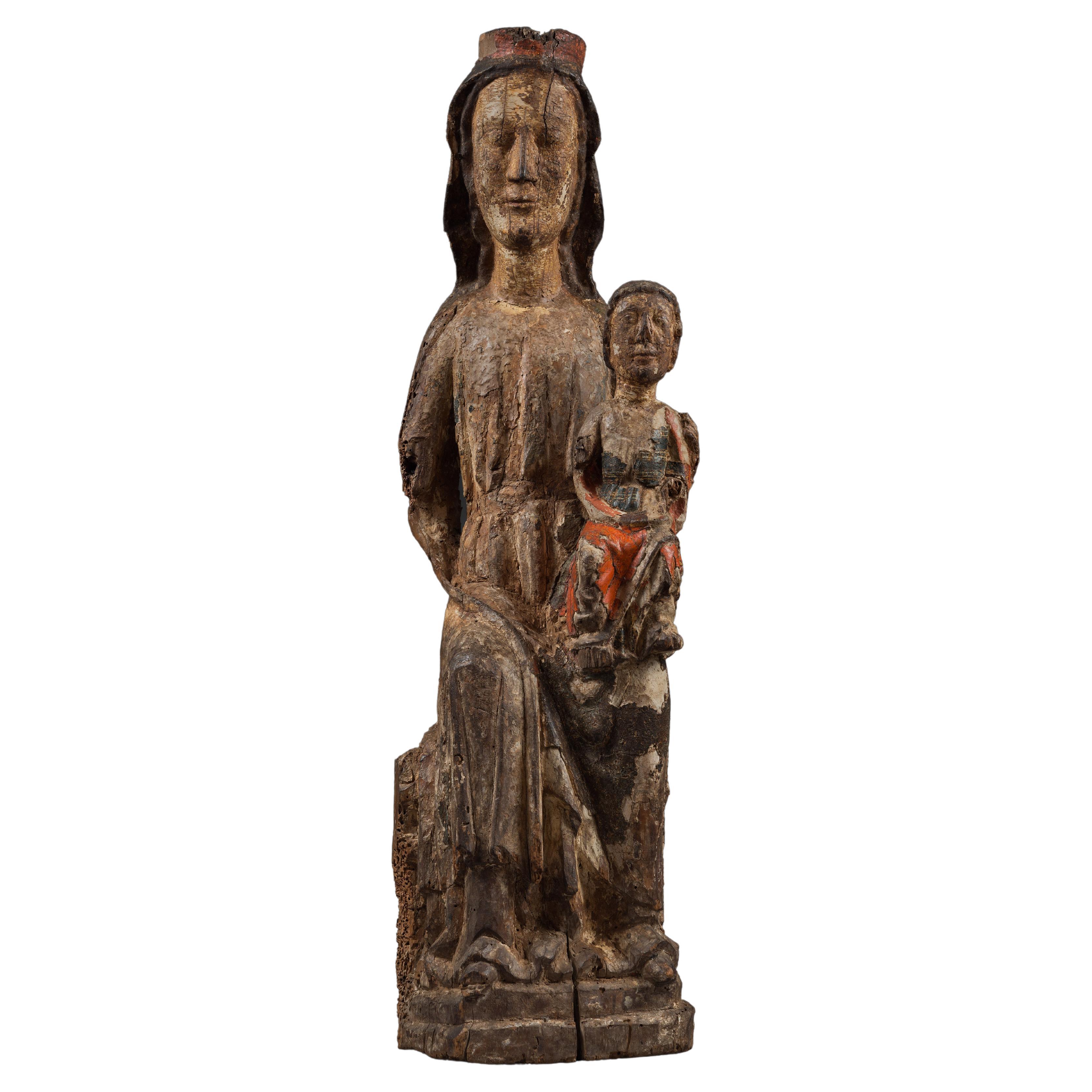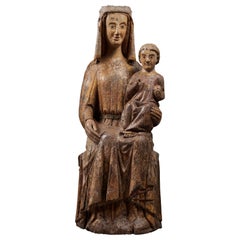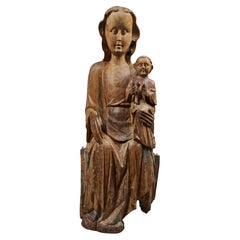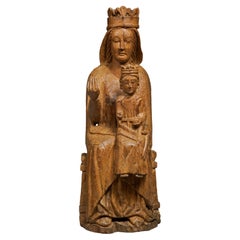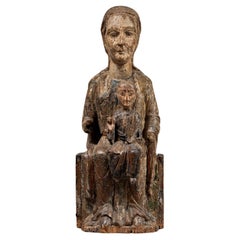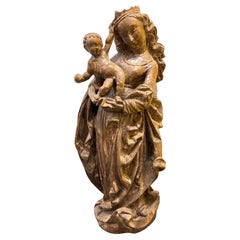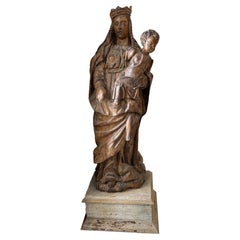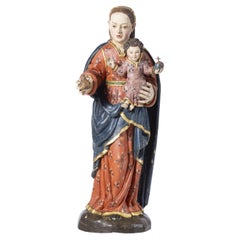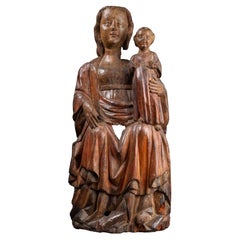Items Similar to Virgin and Child in Majesty
Want more images or videos?
Request additional images or videos from the seller
1 of 8
Virgin and Child in Majesty
$41,576.70
£30,903.38
€35,000
CA$57,710.75
A$64,740.54
CHF 33,472.78
MX$780,806.56
NOK 425,843.86
SEK 398,843.21
DKK 266,442.45
About the Item
Virgin and child in majesty
Origine: castille
Epoque: early 14th century
Measures: Height: 72cm
Length: 30cm
Depth: 25cm
Polychrome and gilt wood
Good condition
By the middle of the 12th century the Virgin Mary appears in churches seating in majesty and acting as a throne for her child Jesus. She is then called Sedes Sapientiae meaning throne of wisdom. She is not really depicted for herself but rather because she has been designated as Theotokos, mother of God, during the council of Ephesus in 431. The same council promulgated Christ’s nature was divine since his birth.
The theme of the virgin and child in Majesty was particularly important during Medieval times. Pilgrims favoured its development while spreading its iconography.
This Virgin and Child seating on a bench throne wears supple clothes elongating her figure. The dress is belted and the collar is round worn under a coat covering her knees. The pleats of the fabric are absolutely Gothic in style. They adopt a strong V shape with deep angles on the cloak and delicate inclined pleats on the tunic.
The Virgin presents an oval face with a straight nose, a small mouth and small round chin. She wears a crown. Her curly hair spreads on her back in well defined strands.
The child does not adopt the hieratic position of 12th century sculpted groups. He slightly turns his head towards his mother’s hand. Furthermore he is presented unsteady giving a sense of movement as well as producing a deep fold, shaped as an M, in his tunic. This detail is characteristic of Castilian productions from the late 13th century and early 14th century.
Indeed the mother and child lose the hieratic aspect present in previous centuries depictions. They are animated with a new sense of movement. The faces are more realistic and the figures are less elongated than during the 13th century, the proportions are well executed. This leads us to think this work was made during the first decade of the 14th century. The smile appearing on both faces support further this datation.
This Virgin and Child is an exceptional example of 14th century Spanish art and it reached us in an equally exceptional condition.
Literature
Fons del Museu Frederic Marès/1, Catàleg d’escultura i pintura medievals, Ajuntament de Barcelona, 1991.
- Dimensions:Height: 28.35 in (72 cm)Width: 11.82 in (30 cm)Depth: 9.85 in (25 cm)
- Materials and Techniques:
- Period:
- Date of Manufacture:Early 14th Century
- Condition:
- Seller Location:Saint-Ouen, FR
- Reference Number:1stDibs: LU3115329587152
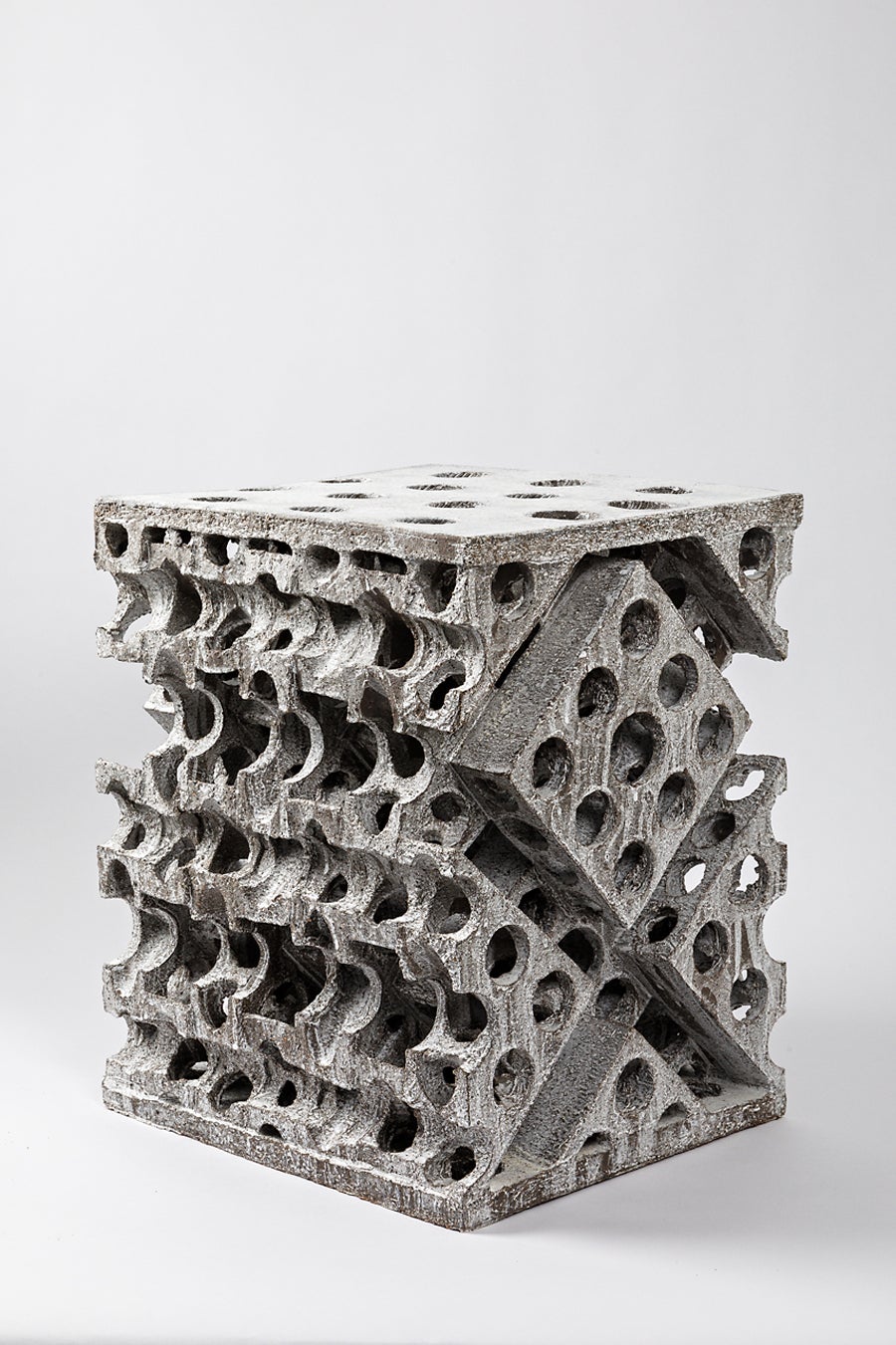
About the Seller
5.0
Vetted Professional Seller
Every seller passes strict standards for authenticity and reliability
Established in 2016
1stDibs seller since 2017
190 sales on 1stDibs
Typical response time: 1 hour
- ShippingRetrieving quote...Shipping from: Saint-Ouen, France
- Return Policy
Authenticity Guarantee
In the unlikely event there’s an issue with an item’s authenticity, contact us within 1 year for a full refund. DetailsMoney-Back Guarantee
If your item is not as described, is damaged in transit, or does not arrive, contact us within 7 days for a full refund. Details24-Hour Cancellation
You have a 24-hour grace period in which to reconsider your purchase, with no questions asked.Vetted Professional Sellers
Our world-class sellers must adhere to strict standards for service and quality, maintaining the integrity of our listings.Price-Match Guarantee
If you find that a seller listed the same item for a lower price elsewhere, we’ll match it.Trusted Global Delivery
Our best-in-class carrier network provides specialized shipping options worldwide, including custom delivery.More From This Seller
View AllImportant Virgin and Child in Majesty
Located in Saint-Ouen, FR
Important virgin and child in majesty
Origin : Germany Or Eastern France
Époque : Second Half Of The 13th Century
Height: 104.5 cm
Length: 3...
Category
Antique 15th Century and Earlier Figurative Sculptures
Materials
Oak
Virgin and Child in Majesty with a Bird
Located in Saint-Ouen, FR
Virgin and child in majesty with a bird
Origin: Southern Germany Or Austria
Period: Late 13tth - Early 14th Century
Height : 87.5 cm
Length : 32 cm
Depth : 19 cm
Lime ...
Category
Antique 15th Century and Earlier Figurative Sculptures
Materials
Wood
Virgin and Child in Majesty, also known as "Sedes Sapientae"
Located in Saint-Ouen, FR
VIRGIN AND CHILD IN MAJESTY, ALSO KNOWN AS "SEDES SAPIENTIAE"
ORIGIN : SPAIN, CATALOGNE
PERIOD: EARLY 13th CENTURY
Height : 95 cm
Width : 32 cm
Depth : 28 cm
Softwood
No polychromy
In the middle of the 12th century, the Virgin took her place in churches, seated in Majesty, serving as a throne for her son Jesus. She is then called Sedes Sapientiae, meaning the Throne of Wisdom.
At that time, she is not represented for herself and only exists because she has been designated as Theotokos, the mother of God, at the Council of Ephesus in 431, where the divine nature of Christ was proclaimed from his birth.
The upright and perfectly hieratic bust of this Virgin and Child in Majesty is seated on a throne-bench. She is dressed in a tunic with a rounded neckline and covered with a fine mantle placed on her narrow shoulders. The supple and natural drapery follows the lines of the body.
Large curls frame her face with delicate and regular features, a long straight nose, almond-shaped eyes, and small lips.
She supports the Infant Jesus with her left hand. Like his mother, he is dressed in a long tunic, and his little feet are visible in the folds. He holds a small sphere in his left hand, while with his right hand, he gestures in blessing. The face of Christ bears a strong resemblance to his mother’s one, and he gives a slight smile.
The position of the Child is no longer as hieratic, nor frontal or central as in the early 12th century, but his face still turns towards the faithful.
The 13th century indeed emerges as a period of transition in the artistic domain. The statuary, while retaining certain characteristics still belonging to the habits of the previous century, also develops new formal solutions.
As a result, Mary maintains a hieratic and frontal position, while her son shifts to place himself well to the left on her knee. Similarly, while the Virgin seems perfectly still, Jesus, on the other hand, appears much more animated, especially in the positioning of his hands. His left hand holds the orb, and judging by the raised right arm directed towards the faithful, one can easily imagine that he was making a gesture of blessing.
The influence of the Sedes Sapientiae from previous centuries still seems particularly prevalent in this work.
These few characteristics allow dating this Spanish Virgin...
Category
Antique 15th Century and Earlier Spanish Gothic Figurative Sculptures
Materials
Softwood
Exceptional Virgin and Child in Majesty or "Sedes Sapientiae", Throne of Wisdom
Located in Saint-Ouen, FR
Exceptional virgin and child in majesty
or “Sedes Sapientiae”, throne of wisdom
Origin: southwestern France.
Period: late 12th - early 13th cen...
Category
Antique 15th Century and Earlier Figurative Sculptures
Materials
Walnut
Virgin and Child "Sedes Sapientiae", Seat of Holy Wisdom
Located in Saint-Ouen, FR
Virgin and child sedes sapientiae, seat of holy wisdom
Origin : Northern Spain, castile, navarre or galicia.
Period : early 13th century.
Heigh...
Category
Antique 15th Century and Earlier Figurative Sculptures
Materials
Wood
Exceptional Virgin with Child in the Style of Salzburg's Madonnas
Located in Saint-Ouen, FR
Exceptionnal polychrome wood virgin with child in the style of Salzburg’s Madonnas
Origin : Central Europe
Era : 19th century
Measures: height : 123...
Category
Antique 19th Century Figurative Sculptures
Materials
Wood
You May Also Like
Antique Statue of Virgin Mary and Child , 19th Century
Located in Basildon, GB
A Pine Carving of Virgin and Child signed E. Lechner. Carved in 15th Century style, a high relief with a hollowed back and depicting the crowned Virgin standing on contrapose with lo...
Category
Antique Mid-19th Century European Gothic Religious Items
Materials
Wood, Pine
Madonna and Child Statue, 17th Century
Located in New Orleans, LA
Carved from wood with lovely details. The pedestal dimensions are 21 W X 16 Deep and 11 H which makes the overall height about 60".
Category
Antique 17th Century Italian Figurative Sculptures
Materials
Wood
Our Lady with Child Jesus Savior of the World 17th Century
Located in Madrid, ES
Our lady with child Jesus savior of the world 17th century
Portuguese sculpture
in polychrome and gilded wood.
Repaints.
Height: 71 cm
very g...
Category
Antique Early 17th Century Portuguese Renaissance Figurative Sculptures
Materials
Wood
$6,177 Sale Price
20% Off
Virgin and the Child, Mosan Region, Second Half of 13th Century
Located in Bruxelles, BE
A polychrome sculpture depicting the Virgin and the Child
Mosan region, second half of 13th century
Polychrome wood
73 x 29 X 12 cm
Provenance :
Former Belgian private collection from the beginning of the 20th century
This remarkable early artwork portrays the Enthroned Virgin and Child, also known as Sedes Sapientiae, which translates to the 'Seat of Wisdom...
Category
Antique 15th Century and Earlier Belgian Medieval Figurative Sculptures
Materials
Wood
15th Century Gothic Virgin
Located in Madrid, ES
15th century Gothic Virgin
Gothic Virgin of the 15th century Virgin in carved and polychrome wood of the 15th century. In its original state, muse...
Category
Antique 15th Century and Earlier Figurative Sculptures
Materials
Wood
$16,630 Sale Price
20% Off
18th Century French Carved Statue of Madonna and Child
Located in Godshill, Isle of Wight
18th century French carved statue of Madonna and Child.
This charming piece has been rescued from a ecclesiastic clear out in the southern part of France
The statue is carved fro...
Category
Antique Mid-18th Century Mission Figurative Sculptures
More Ways To Browse
Virgin And Child
Spanish Furniture 15th Century
14th Century Medieval
Jesus Christ Sculpture
Gothic Wood Sculpture
Virgin Mary Wood
Child Head Sculpture
Spain Polychrome Sculpture
Barcelona Bench
Bench With Faces
Jesus Child Sculpture
15th Century Polychrome Sculpture
Head Of Jesus
Polychrome Jesus
Polychrome Virgin
Church Bench
Castilian Furniture
Antique Folding Bench
